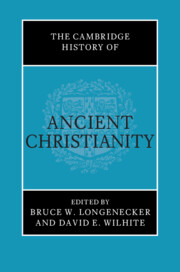Book contents
- The Cambridge History of Ancient Christianity
- The Cambridge History of Ancient Christianity
- Copyright page
- Contents
- Figures
- List of Contributors
- Editors’ Preface
- Part I Contested Contexts
- Part II Contested Figures
- Part III Contested Heritage
- Part IV Contested Cultures
- 14 Early Christians and Their Socioeconomic Contexts
- 15 Early Christians and Roman Imperial Ideology
- 16 Martyrdom between Fiction and Memory
- 17 The Emergence(s) of Christian Material Culture(s)
- 18 Manuscripts and the Making of the New Testament
- Part V Contested Beliefs
- Part VI Contested Bodies
- Ancient Sources
- Modern Authors
- References
15 - Early Christians and Roman Imperial Ideology
from Part IV - Contested Cultures
Published online by Cambridge University Press: 23 August 2023
- The Cambridge History of Ancient Christianity
- The Cambridge History of Ancient Christianity
- Copyright page
- Contents
- Figures
- List of Contributors
- Editors’ Preface
- Part I Contested Contexts
- Part II Contested Figures
- Part III Contested Heritage
- Part IV Contested Cultures
- 14 Early Christians and Their Socioeconomic Contexts
- 15 Early Christians and Roman Imperial Ideology
- 16 Martyrdom between Fiction and Memory
- 17 The Emergence(s) of Christian Material Culture(s)
- 18 Manuscripts and the Making of the New Testament
- Part V Contested Beliefs
- Part VI Contested Bodies
- Ancient Sources
- Modern Authors
- References
Summary
Although the Christian movement of the first century was birthed under the shadow of Rome’s empire, it was only in the late twentieth century that New Testament scholars began giving serious consideration to the ways in which that movement engaged and challenged Roman imperial power. This relatively recent avenue of scholarly inquiry, which many refer to as “empire criticism,” is the focus of this essay. In particular, this essay will consider the emergence of this criticism, discuss diverse ways early Christian writings engaged the Roman empire, recognize and respond to scholarly criticism, and offer a concluding note on empire criticism and the Christian movement in the second and third centuries.
- Type
- Chapter
- Information
- The Cambridge History of Ancient Christianity , pp. 347 - 371Publisher: Cambridge University PressPrint publication year: 2023

